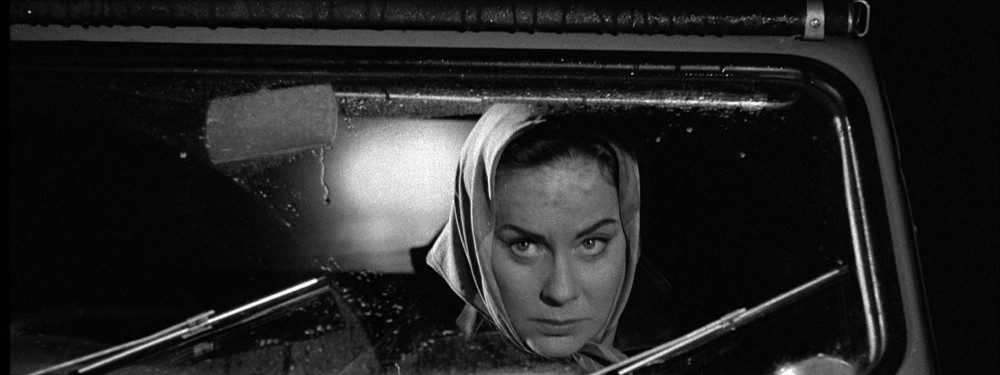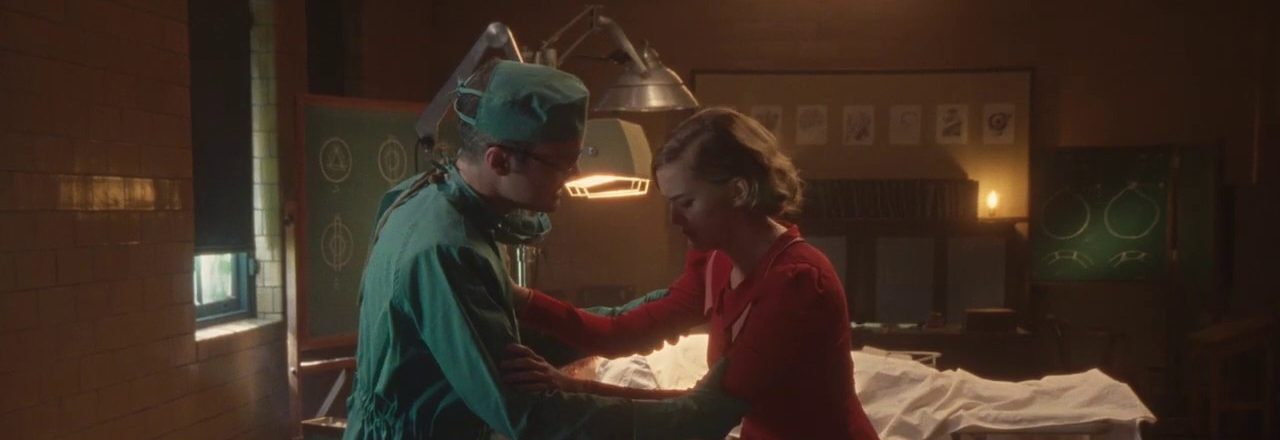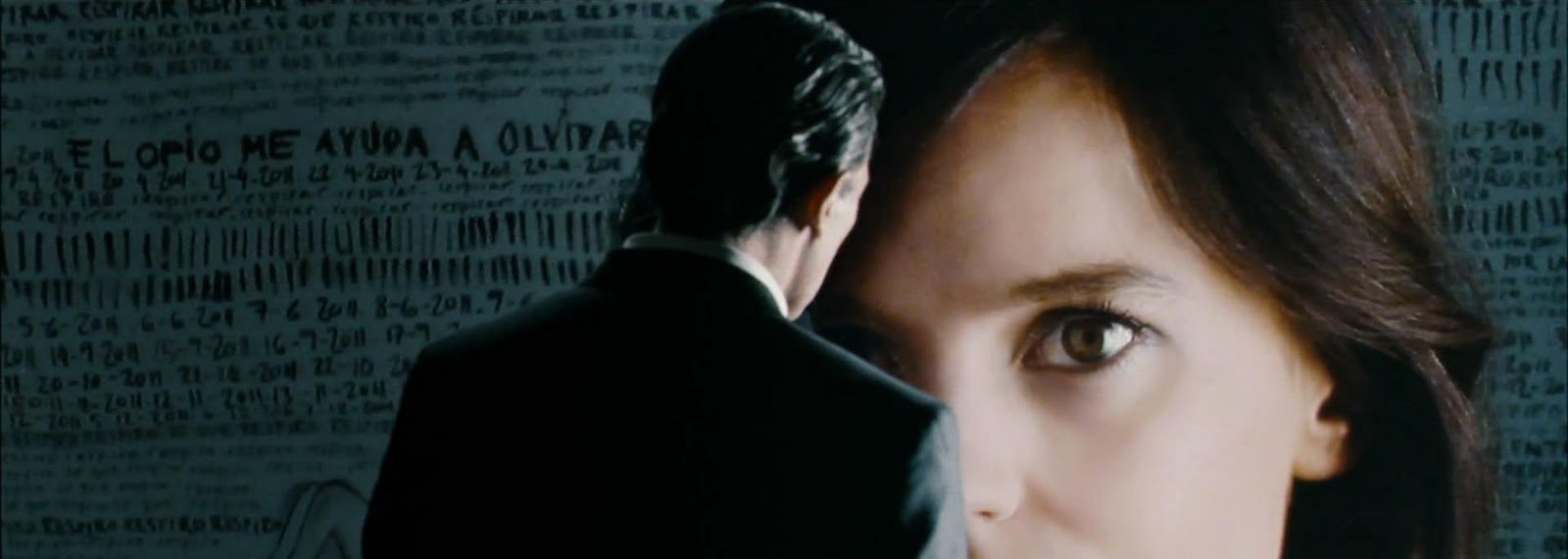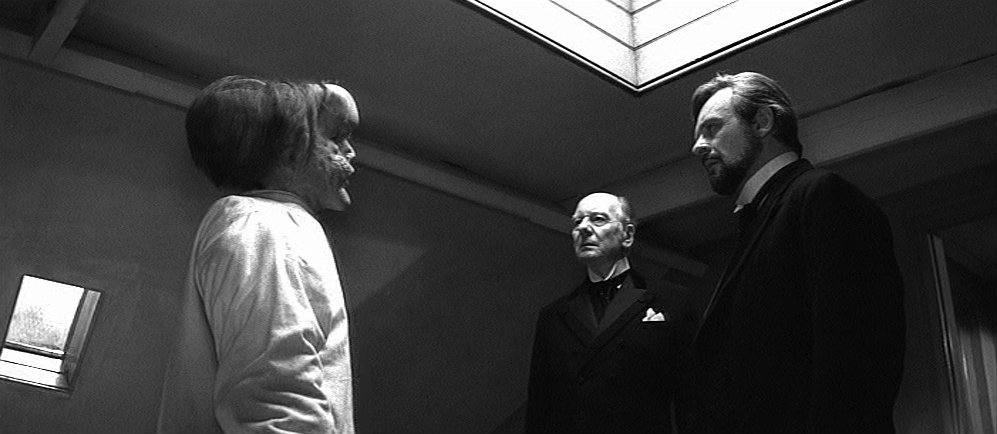‘A Different Man’ dives deep into the complex layers of identity, self-perception, and the haunting grip of the past. Directed by Aaron Schimberg and starring Sebastian Stan in the lead, this psychological drama follows a man who undergoes facial reconstruction surgery only to find himself obsessed with the actor portraying him in a stage play based on his life. The film’s eerie atmosphere and poignant exploration of alienation make it an unforgettable experience that lingers long after the credits roll. If you were compelled by the unsettling psychological tension and character-driven narrative of ‘A Different Man,’ there’s a world of films offering similar themes. From exploring fractured identities to the dark corners of human obsession, these movies capture the same intensity while adding their unique spin. This list features movies similar to ‘A Different Man,’ blending elements of psychological drama, identity crises, and haunting self-reflection.
10. Eyes Without a Face (1960)

Georges Franju’s ‘Eyes Without a Face’ is a haunting and poetic exploration of guilt, obsession, and the dark lengths one might go to for redemption. The film follows Dr. Génessier, a brilliant but morally compromised surgeon, tormented by the disfigurement of his once-radiant daughter, Christiane, after a car accident he caused. Consumed by guilt and a desire to restore her beauty, he abducts young women with the help of his loyal assistant, Louise. In his secluded mansion, he performs grotesque experiments, surgically removing his victims’ faces in a desperate attempt to graft them onto Christiane.
Adapted from Jean Redon’s novel of the same name, Franju’s movie is a chilling blend of body horror and psychological drama. The film’s grounded yet disturbing premise taps into universal fears of identity and the fragility of human perfection. Its dreamlike visuals, eerie surgical sequences, and Christiane’s hauntingly impassive mask elevate it to an otherworldly level. Like ‘A Different Man,’ ‘Eyes Without a Face’ explores the themes of disfigurement, self-perception, and obsession. Both films explore how physical transformation, or the pursuit of it: reveals deeper emotional scars, making Franju’s classic a perfect companion to Schimberg’s psychological odyssey.
9. Beast (2017)

Directed by Michael Pearce, ‘Beast’ is a provocative and atmospheric character study that lures the audience into a world of twisted desires, hidden secrets, and emotional turmoil. The film centers around Moll (Jessie Buckley), a young woman living under the oppressive rule of her family, who becomes romantically involved with Pascal (Johnny Flynn), a mysterious and possibly dangerous man with a dark past. As the two become entwined in an intense, volatile relationship, Moll’s emotional struggles and her desire to break free from her past clash with the haunting, unresolved mysteries surrounding Pascal. What starts as a seemingly straightforward romance soon turns into a nerve-racking mystery, with the truth about Pascal’s character slowly unraveling in unpredictable and disturbing ways.
The film draws heavily from the psychological thriller genre, with its slow-burn narrative and stunning performances that carry the weight of the film’s emotional journey. Buckley’s performance as Moll is nothing short of extraordinary, capturing the complexity of a woman trapped between love, guilt, and self-identity. Like A Different Man, ‘Beast’ explores themes of transformation—both physical and psychological—and the effects of trauma on one’s self-perception. Both films focus on deeply troubled characters navigating a maze of their own internal struggles, showing how love can become entangled with manipulation and obsession. The visceral intensity of’ Beast’ mirrors the emotional turmoil in ‘A Different Man,’ making it a fitting recommendation for those seeking a similarly unsettling exploration of identity and relationships.
8. Swallow (2019)

‘Swallow’ is an eloquent and haunting exploration of female oppression, trauma, and the physical manifestation of emotional pain. The Carlo Mirabella-Davis directorial follows Hunter (Haley Bennett), a seemingly perfect suburban housewife who begins to compulsively swallow inedible objects—an act that brings her a sense of control over her otherwise oppressive and stifling life. Hunter’s plight is not just about the objects she consumes but is emblematic of her struggle to reclaim agency in a life dictated by societal expectations and a controlling, abusive marriage. As she becomes increasingly isolated in her bizarre behavior, Swallow delves deeply into the emotional scars left by her husband (Austin Stowell) and her family’s toxic dynamic, exposing the harsh realities of living under constant scrutiny.
Swallow’s portrayal of psychological and physical trauma resonates with authenticity, capturing the desperation of a woman trapped in a gilded cage. Hunter’s journey is depicted with striking sensitivity, as her compulsions serve as a cry for freedom from a world that stifles her spirit. Bennett’s performance is mesmerizing—sensitive, strong, and vulnerable all at once—rendering Hunter’s internal struggle palpable. In much the same way that ‘A Different Man’ portrays the complexities of self-identity and the struggle for autonomy, ‘Swallow’ shines a light on the extremes to which a woman will go to regain control of her life and body. Both films examine themes of transformation as the protagonists seek liberation in a world that has defined them in limiting, damaging ways. The emotional intensity and catharsis found in Swallow make it an excellent companion for viewers drawn to ‘A Different Man,’ as both films masterfully tackle the human desire to break free from the chains of societal expectations and personal trauma.
7. Chained For Life (2018)

‘Chained for Life’ is a darkly introspective and experimental film that explores the layers of identity and the exploitation of physical deformity in cinema. The film by Aaron Schimberg centers on Rosenthal (Adam Pearson), a disfigured actor starring in a low-budget horror movie, where he plays a character who embodies society’s fears of the “ugly” and monstrous. As Rosenthal struggles to remember his lines and navigate the often-toxic film industry environment, he dreams of a simpler, more socially accepted life as a waiter—a role that, for him, feels just as unattainable as his cinematic dreams.
The movie blurs the lines between reality and fiction, offering a self-aware meditation on the portrayal of physical anomalies and the societal stigmas attached to them. It critiques how filmmakers often exploit disfigurement for shock value or villainous roles, symbolized by the “ugly” monster character that hangs in the background, waiting to be used again. In doing so, Chained for Life sheds light on the damaging, reductive lens through which people with physical differences are often viewed in popular culture.
‘Chained For Life’ offers a poignant commentary on the dehumanization and othering of individuals with visible disabilities. Much like ‘A Different Man,’ which tackles themes of self-identity and transformation, ‘Chained for Life’ dissects the internal and external struggles of living in a world that defines you by your appearance. The film’s exploration of the tension between personal desire and societal expectations mirrors the internal conflicts seen in ‘A Different Man,’ where the protagonist must confront how others perceive his outward appearance. Both films engage with the notion of reclaiming one’s identity from the gaze of others, making Chained for Life a compelling and thought-provoking counterpart to ‘A Different Man.’
6. The Skin I Live In (2011)

Pedro Almodóvar’s ‘The Skin I Live In’ is a chilling and meticulously crafted psychological thriller that takes the audience on a harrowing journey into the dark recesses of obsession, identity, and revenge. The film stars Antonio Banderas as Dr. Robert Ledgard, a renowned plastic surgeon who, driven by grief and a need for control, conducts experimental skin grafting on a woman named Vera (Elena Anaya), who is confined to his mansion under mysterious circumstances. As the narrative unravels, the twisted and disturbing nature of Ledgard’s experiments becomes clear, forcing viewers to confront uncomfortable truths about human desire, manipulation, and transformation.
With its stark, methodical pacing and moments of searing emotional intensity, The Skin I Live In pushes its audience into the depths of discomfort, leaving them breathless by its conclusion. Almodóvar’s direction is nothing short of brilliant, as he expertly manipulates the story’s secrets, revealing them at just the right moment to maximize impact. The film’s unflinching portrayal of trauma, both physical and psychological, demands an active engagement from the viewer, rewarding them with a darkly satisfying experience that refuses to offer easy answers.
‘The Skin I Live In’ is inspired by the 1995 novel ‘Tarantula’ by Thierry Jonquet. Similar to ‘A Different Man,’ the film explores themes of identity, bodily autonomy, and transformation. Both films probe the psychological toll of physical change, albeit through different methods, with ‘The Skin I Live In’ using medical experimentation and ‘A Different Man’ focusing on the transformative power of a face transplant. Both also delve into the emotional complexities of self-perception and the painful search for identity in a world that often defines individuals by their appearances.
5. Border (2018)

Helmed by Ali Abbasi, ‘Border’ is a mesmerizing and unconventional film that blends dark fantasy with intimate, grounded human drama. Based on the short story ‘Gräns’ by John Ajvide Lindqvist, the same author behind ‘Let the Right One In,’ the film follows Tina (Eva Melander), a border guard with an extraordinary sense of smell, who discovers a stranger (Eero Milonoff) who shares her peculiar physical traits and abilities. As their connection deepens, the film unfolds into a haunting exploration of identity, belonging, and the alienation of being different in a society that values conformity. The blend of fantasy elements and raw, emotional storytelling makes Border both disturbing and deeply empathetic, creating a world that is both strange and real.
What stands out about ‘Border’ is its remarkable ability to ground its supernatural elements in a very relatable and tactile reality. The film captures the ordinary details—the duct tape on the refrigerator, the mundane interactions—while introducing its bizarre supernatural elements, creating a sense of verisimilitude that pulls the audience in. The prosthetics, music, and performances further enhance the film’s unique atmosphere. Like ‘A Different Man’, ‘Border’ uses the themes of physical transformation and the alienation of living in an unfamiliar body to explore deep questions about identity and selfhood. Both films delve into the transformative power of appearance, but whereas ‘A Different Man’ tackles it through the lens of facial reconstruction, ‘Border’ uses its protagonist’s strange, non-human traits to question societal perceptions of beauty and acceptance.
4. Thirst Street (2017)

‘Thirst Street’, is a seductive blend of psychodrama and dark comedy that dives into obsession, identity, and delusion. Set against the vibrant backdrop of Paris, the Nathan Silver directorial follows Gina (Lindsay Burdge), an American flight attendant who embarks on an ill-fated romance with a Parisian bartender (Damien Bonnard) during a layover. What begins as a passionate fling quickly unravels as Gina becomes trapped in a spiraling web of deception, unrequited love, and self-destructive obsession. The film is propelled by Burdge’s masterful performance, which showcases an impressive range of face acting—capturing the inner turmoil of a woman slowly losing grip on her sense of reality.
The cinematography by Sean Price Williams adds another layer of visual intensity with its bold framing and color schemes that complement the film’s emotional volatility. The stark contrast between Gina’s romanticized view of the relationship and the cold reality she faces mirrors the themes of ‘A Different Man,’ which also explores the psychological complexities that come with transformations in identity. Both films engage with the tension between self-perception and how others view us, but while ‘A Different Man’ focuses on the physical and emotional changes brought on by a new face, ‘Thirst Street’ delves into the havoc wreaked by unreciprocated desire and emotional desperation.
3. Under The Skin (2013)

‘Under the Skin’ is a masterclass in visual storytelling, transcending the typical science fiction genre by offering an intensely atmospheric and haunting experience. Directed by Jonathan Glazer, the film is an adaptation of Michel Faber’s novel, also titled ‘Under the Skin,’ which immerses the viewer in the eerie journey of an alien entity (Scarlett Johansson) as she finds her way through a cold, detached human world. The movie takes the premise of the book and reimagines it into a sparse, minimalist narrative that is as much about the feelings of isolation and observation as it is about its protagonist’s alien nature. It brilliantly juxtaposes surreal moments with the grittiness of social realism, capturing ordinary, often desolate human experiences in Scotland.
Glazer uses color, shape, and texture with such precision that every shot feels carefully orchestrated to evoke the rawness of human existence and the unsettling nature of the alien presence. Johansson’s portrayal of the alien character is mesmerizing: her expressionless, hypnotic demeanor adds an additional layer of alienation that is both entrancing and deeply unsettling. Comparing ‘Under the Skin’ to ‘A Different Man,’ both films explore themes of identity, alienation, and the manipulation of human experience. While ‘Under the Skin’ presents a cold, unfeeling external force, ‘A Different’ Man delves into the human psyche in its search for self-transformation. Both films focus on the uncomfortable nature of observing and being observed, with deeply introspective looks at the characters’ relationships to their environments and bodies.
2. Holy Motors (2012)

‘Holy Motors’ is a surreal exploration of identity, transformation, and the volatile nature of human experience. The film follows a mysterious character, Monsieur Oscar (Denis Lavant), as he transitions through multiple roles over the course of a single day. Each “life” he assumes is drastically different and yet linked by the overarching theme of performance. He is a cold, almost emotionless figure who shifts from being a murderer to a beggar to a monstrous creature to a family man—each identity complete with its own set of rituals, encounters, and emotional stakes. In this constant transformation, ‘Holy Motors’ questions the very nature of identity and the art of acting, blurring the lines between performance and reality. The film’s structure is deliberately disjointed, reflecting the fragmented, transient nature of the protagonist’s existence.
The interwoven stories draw on absurdity, dark humor, and hauntingly poignant moments, all wrapped in Carax’s unique visual style. Lavant’s performance is nothing short of extraordinary, as he seamlessly shifts between characters with a physicality and intensity that feels almost otherworldly. When compared to ‘A Different Man,’ both films examine the quest for reinvention and the performative aspects of identity. In ‘A Different Man,’ the protagonist’s physical transformation and a quest for a new self take center stage, while Holy Motors presents an ongoing, almost existential fluidity of roles that the character adopts throughout the day. Both films share a meditation on the human need to escape the limitations of one’s former self, yet ‘A Different Man’ focuses more on the psychological and physical toll of transformation, whereas ‘Holy Motors’ revels in the almost absurd liberation that comes with shedding one identity for another.
1. The Elephant Man (1980)

‘The Elephant Man’ is a heartbreaking exploration of human dignity, identity, and society’s treatment of those who fall outside its norms. Based on the true story of Joseph Merrick, known as John Merrick, in the film, the narrative follows the life of a man living with severe deformities in 19th-century London. Joseph, cruelly exploited as a sideshow attraction, is rescued by Dr. Frederick Treves (Anthony Hopkins), who is a compassionate surgeon. As the story unfolds in the David Lynch directorial, Merrick is revealed to be far more than the grotesque exterior that society labels him with. Beneath the physical deformities lies a man of great intellect, sensitivity, and, most profoundly, a deep yearning for human connection.
Lynch’s masterful direction ensures that the film avoids the melodrama that could easily have overwhelmed such a subject. Instead, the film is a somber and intimate portrait of a man struggling to be seen for who he truly is rather than what he appears to be. The film’s cinematography, stunningly captured in black and white, serves to emphasize the stark contrast between Merrick’s outward appearance and his inner humanity. John Hurt’s portrayal of Merrick is nothing short of extraordinary, as he brings to life a character who, despite being physically isolated, overflows with emotional depth and complexity.
When compared to ‘A Different Man,’ ‘The Elephant Man’ is a poignant meditation on the pain and vulnerability inherent in physical transformation, both externally and internally. While ‘A Different Man’ explores a psychological journey of self-reinvention through a transformative procedure, ‘The Elephant Man’ focuses on how society’s perception of physical appearance can hinder one’s ability to connect with others. Both films powerfully ask whether it is possible to look beyond the surface and truly understand a person for who they are. In ‘A Different Man,’ the protagonist’s struggle for identity is rooted in his quest for acceptance and external validation, whereas in ‘The Elephant Man,’ Merrick’s journey is a desperate attempt to be seen as more than his outward deformities, to find friendship, and to be accepted for his soul, rather than his body. If you liked ‘A Different Man,’ you will adore ‘The Elephant Man’ for all of its complexities and emotions.
Read More: A Different Man: Is The Movie a True Story?


You must be logged in to post a comment.